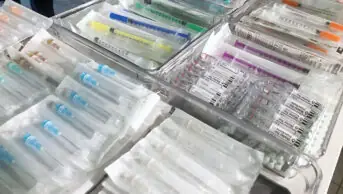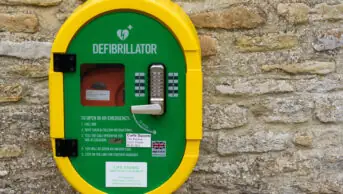
Shutterstock.com
For a decade, drug-related death rates in the UK have escalated to among the highest levels in Europe, with 4,565 deaths related to the use of illicit drugs in 2021[1–4]. This has occurred alongside significant cuts to drug treatment and other protective services[5,6]. Premature mortality among the most marginalised will likely be exacerbated by the evolving cost-of-living crisis, with more harmful patterns of drug use strongly associated with socioeconomic deprivation[7,8].
The 2021 UK government drugs strategy, ‘From harm to hope’, laudably recognised that current approaches are not effectively reducing drug-related harm and identified the need for change[9]. However, the Faculty of Public Health and Association of Directors of Public Health have argued the strategy’s approach is still not sufficiently public health-orientated, as recommended by the United Nations, and instead maintains a focus on drug use as an issue of criminality[10,11].
Punishing those who drug policy should be aiming to protect, and exacerbating factors that may predispose an individual to harmful drug use, is counterproductive. Contact with the criminal justice system is associated with a range of medical and social disadvantages[12]. Receiving a criminal record for personal drug possession, and associated punishments (such as incarceration and loss of liberty), may disrupt supportive family relationships and affect access to housing and employment. It also impacts on the person’s opportunities and how they are treated by other members of society. This aggravates pre-existing levels of socioeconomic deprivation and psychological trauma — factors strongly associated with harmful patterns of drug use; and creates barriers to accessing help and support when individuals require it[8,13].
Many people who use drugs face significant levels of stigma, with the public and healthcare providers often holding negative views towards them, and this is reflected in some healthcare policies
Many people who use drugs face significant levels of stigma, with the public and healthcare providers often holding negative views towards them, and this is reflected in some healthcare policies[14–17]. This stigma can have significant negative consequences on the mental health and wellbeing of those affected, along with their experiences of healthcare services (including pharmacy), which impacts upon their willingness to access them[18]. This can lead to delays in seeking care and worsening health conditions[19].
Criminalisation and stigma are closely intertwined: people who use drugs in the UK are punished (and stigmatised) in an effort to deter others from using drugs[9,20]. There is, however, no convincing evidence that this reduces the prevalence of harmful drug use. The Home Office in 2014 highlighted there are many other factors that influence levels of drug use, beyond legislation and enforcement, including cultural trends and levels of social support[21]. Accordingly, studies demonstrate there is no clear relationship between the stringency of drug laws and levels of drug use in different countries[22–26]. Regardless of whether enforcement does affect levels of drug use, a higher proportion of people may use drugs in riskier ways to avoid detection and punishment[14].
‘From harm to hope’ included a promising endorsement of drug diversion schemes, albeit referred to as “tough consequences out-of-court disposals”[9]. This approach has been implemented by at least 13 UK police forces, and offers opportunities to divert people from the criminal justice system into targeted support, education, and sometimes treatment — if indicated and desirable[27,28]. A growing body of international evidence has demonstrated that diversion schemes may reduce the social and financial costs of drug use more cost-effectively than criminalisation, given the latter’s significant deleterious impacts[28].
Following the drugs strategy, in 2022, the ‘Swift, Certain, Tough’ white paper was published, in which the government proposed a new approach to managing drug possession in the UK[29]. However, instead of drawing on existing promising models of diversion for personal possession, the proposals detail an escalating system of increasingly onerous monitoring and punishment, which will be applied alongside criminal sanctions. Individuals found in the possession of drugs for the first time will receive a fixed penalty notice and will be required to attend a mandatory ‘drugs awareness course’. If apprehended a second time, individuals will receive a caution (a criminal record), a second drugs awareness course, and a period of random short-notice drug testing, with positive tests or non-compliance possibly resulting in a formal charge. If caught a third time, formal court proceedings will be undertaken, alongside another drugs awareness course and further additional sanctions. These will include either an exclusion order, barring the individual from certain places, the confiscation of passports and driving licences, or the requirement to wear a ‘drug tag’ — an experimental drug detector[29].
Considered separately, various aspects of these proposals are problematic. While the first drugs awareness course would be preferable to criminal sanctions, the associated enforcement notice may be disclosed on enhanced Disclosure and Barring Service checks, limiting future employment opportunities. In addition, it is expected that individuals will pay for the course, or there will be fines for non-attendance, potentially exacerbating socioeconomic inequalities. The cautions and court proceedings in the latter tiers will perpetuate existing issues with criminal sanctions for drug possession offences. Confiscating an individual’s driving licence may mean they are unable to perform their job; and confiscating a passport is grossly disproportionate when compared with other instances when this might occur, such as suspected terrorism[30]. Furthermore, it is not justifiable to use unvalidated and experimental technologies (drug tags) to dictate whether someone receives a potentially life-changing punishment.
In contrast to the assertion that evidence is “at the heart” of the government’s approach, the proposals are not sufficiently based on existing evidence, nor is there convincing rationale or sufficient clinical equipoise to justify research studies[9]. The proposals will likely exacerbate levels of pre-existing stigma, and its well-recognised deleterious impacts on people who use drugs, with wide-ranging impacts on how healthcare, including pharmacy provision, is provided.
It is not clear how the proposals will avoid disproportionately impacting economically disadvantaged communities, and certain ethnic groups in particular, with people who are black significantly more likely to face the brunt of existing drug enforcement[31]. Additionally, the proposals will attract considerable cost, when local authorities, police forces and court systems are already overstretched and underfunded.
These funds could otherwise be utilised to provide evidence-based drug treatment and harm reduction interventions, in which pharmacists play a vital role: perhaps monies could be better spent, for example, on improving payments for community pharmacy provision of interventions for people who use drugs? Many community pharmacies offer services such as supervised consumption, take-home naloxone and needle syringe provision, but increasingly contractors are opting out of these services, or pharmacy closures mean that adequate coverage remains an ongoing challenge: increased funding would assist with improving provision and reducing drug-related harms.
Perhaps interventions for people who use drugs would be more appropriate as an ‘essential’ service provision within the community pharmacy contractual framework
Owing to ease of access, community pharmacy is ideally placed to remove barriers for people who need healthcare, since they are embedded within local communities and readily accessible without the need for appointments. As well as directly offering a range of harm-reduction interventions they can also signpost to other services, such as GPs, hospitals and specialist drug treatment and sexual health services. However, the community pharmacy contractual framework requires improvements so that pharmacies can continue to operate, and with greater equity, in the services that they offer to people who use drugs. Perhaps interventions for people who use drugs would be more appropriate as an ‘essential’ service provision within the community pharmacy contractual framework, which would also be in line with the government’s plans for reducing health inequalities.
Concerns about the white paper have led to around 500 organisations and individuals working in health and social care, drug policy, criminal justice and human rights to write to the government, asking them to rethink their proposals[32]. Signatories of the letter, co-organised by the organisations Release and Transform Drug Policy Foundation, include the Faculty of Public Health, Association of Directors of Public Health, NHS Addictions Provider Alliance, third-sector drug treatment providers, and the College of Mental Health Pharmacy.
Bodies calling for a more dramatic shift in the UK response to drugs include the 2019 Health and Social Care Committee on drugs policy, the Royal Society for Public Health, the Faculty of Public Health, Association of Directors of Public Health, and the Royal College of Physicians, and they have called for the decriminalisation of drug possession for personal use as part of wider reorientation towards a public health approach[33–36].
The pharmacy sector plays an essential role in providing interventions to reduce drug-related harm. So, too, does it have a powerful voice to promote policies that better reflect its professional values. If this is something that, as a pharmacy professional, you are supportive of, perhaps consider signing the cross-agency letter calling on the government to rethink the current proposals.
This form can be used to sign the cross-agency letter calling on government to rethink the white paper proposals.
- 1European Drug Report. European Monitoring Centre for Drugs and Drug Addiction. 2022.https://www.emcdda.europa.eu/system/files/publications/14644/TDAT22001ENN.pdf (accessed Jan 2023).
- 2Deaths related to drug poisoning by local authority, England and Wales. Office for National Statistics. 2022.https://www.ons.gov.uk/peoplepopulationandcommunity/birthsdeathsandmarriages/deaths/datasets/drugmisusedeathsbylocalauthority (accessed Jan 2023).
- 3Drug Related Deaths in Scotland. National Records of Scotland. 2021.https://www.nrscotland.gov.uk/statistics-and-data/statistics/statistics-by-theme/vital-events/deaths/drug-related-deaths-in-scotland (accessed Jan 2023).
- 4Drug-Related Deaths. Northern Ireland Statistics and Research Agency. 2021.https://www.nisra.gov.uk/statistics/cause-death/drug-related-deaths (accessed Jan 2023).
- 5Review of drugs part two: prevention, treatment, and recovery. Department of Health and Social Care. 2021.https://www.gov.uk/government/publications/review-of-drugs-phase-two-report/review-of-drugs-part-two-prevention-treatment-and-recovery (accessed Jan 2023).
- 6Marmot M. Health equity in England: the Marmot review 10 years on. BMJ. 2020;:m693. doi:10.1136/bmj.m693
- 7McKee M. What should the health community be saying to our new prime minister? BMJ. 2022;:o2147. doi:10.1136/bmj.o2147
- 8Marmot M. Fair society, healthy lives. The Marmot Review. 2010.https://www.parliament.uk/globalassets/documents/fair-society-healthy-lives-full-report.pdf (accessed Jan 2023).
- 9From harm to hope: A 10-year drugs plan to cut crime and save lives. UK government. 2022.https://www.gov.uk/government/publications/from-harm-to-hope-a-10-year-drugs-plan-to-cut-crime-and-save-lives/from-harm-to-hope-a-10-year-drugs-plan-to-cut-crime-and-save-lives (accessed Jan 2023).
- 10Holland A, Stevens A, Harris M, et al. Analysis of the UK Government’s 10-Year Drugs Strategy—a resource for practitioners and policymakers. Journal of Public Health. 2022. doi:10.1093/pubmed/fdac114
- 11United Nations system common position supporting the implementation of the international drug control policy through effective inter-agency collaboration. United Nations Chief Executives Board for Coordination. 2018.https://unsceb.org/sites/default/files/2021-01/2018%20Nov%20-%20UN%20system%20common%20position%20on%20drug%20policy.pdf (accessed Jan 2023).
- 12Balancing act: Addressing health inequalities among people in contact with the criminal justice system. Revolving Doors, Probation Chiefs Association and Public Health England. 2013.https://www.choiceforum.org/docs/door.pdf (accessed Jan 2023).
- 13Adverse Childhood Experiences and their impact on health-harming behaviours in the Welsh adult population. British Association of Social Workers. 2015.https://www.basw.co.uk/resources/adverse-childhood-experiences-and-their-impact-health-harming-behaviours-welsh-adult (accessed Jan 2023).
- 14Rae M, Howkins J, Holland A. Escalating drug related deaths in the UK. BMJ. 2022;:o2005. doi:10.1136/bmj.o2005
- 15Yang LH, Wong LY, Grivel MM, et al. Stigma and substance use disorders. Current Opinion in Psychiatry. 2017;30:378–88. doi:10.1097/yco.0000000000000351
- 16van Boekel LC, Brouwers EPM, van Weeghel J, et al. Stigma among health professionals towards patients with substance use disorders and its consequences for healthcare delivery: Systematic review. Drug and Alcohol Dependence. 2013;131:23–35. doi:10.1016/j.drugalcdep.2013.02.018
- 17Harris M, Holland A, Lewer D, et al. Barriers to management of opioid withdrawal in hospitals in England: a document analysis of hospital policies on the management of substance dependence. BMC Med. 2022;20. doi:10.1186/s12916-022-02351-y
- 18Lancaster D, Seear K, Ritter A. Reducing stigma and discrimination for people experiencing problematic alcohol and other drug use. National Drug & Alcohol Research Centre. 2017.https://ndarc.med.unsw.edu.au/sites/default/files/ndarc/resources/Reducing%20stigma%20and%20discrimination%20for%20people%20experiencing%20problematic%20alcohol%20and%20other%20drug%20use.pdf (accessed Jan 2023).
- 19Harris M. Normalised pain and severe health care delay among people who inject drugs in London: Adapting cultural safety principles to promote care. Social Science & Medicine. 2020;260:113183. doi:10.1016/j.socscimed.2020.113183
- 20Problem drug use in Scotland: Government response to the Committee’s First Report of Session 2019. UK Parliament. 2019.https://publications.parliament.uk/pa/cm5801/cmselect/cmscotaf/698/69802.htm (accessed Jan 2023).
- 21Drugs: International comparators. Home Office. 2014.https://assets.publishing.service.gov.uk/government/uploads/system/uploads/attachment_data/file/368489/DrugsInternationalComparators.pdf (accessed Jan 2023).
- 22Gabri AC, Galanti MR, Orsini N, et al. Changes in cannabis policy and prevalence of recreational cannabis use among adolescents and young adults in Europe—An interrupted time-series analysis. PLoS ONE. 2022;17:e0261885. doi:10.1371/journal.pone.0261885
- 23Stevens A. Is policy ‘liberalization’ associated with higher odds of adolescent cannabis use? A re-analysis of data from 38 countries. International Journal of Drug Policy. 2019;66:94–9. doi:10.1016/j.drugpo.2019.01.013
- 24Hughes B, Matias J, Griffiths P. Inconsistencies in the assumptions linking punitive sanctions and use of cannabis and new psychoactive substances in Europe. Addiction. 2018;113:2155–7. doi:10.1111/add.14372
- 25Scheim AI, Maghsoudi N, Marshall Z, et al. Impact evaluations of drug decriminalisation and legal regulation on drug use, health and social harms: a systematic review. BMJ Open. 2020;10:e035148. doi:10.1136/bmjopen-2019-035148
- 26Eastwood N, Fox E, Rosmarin A. A Quiet Revolution: Drug Decriminalisation Across the Globe . Release. 2016.https://www.release.org.uk/sites/default/files/pdf/publications/A%20Quiet%20Revolution%20-%20Decriminalisation%20Across%20the%20Globe.pdf (accessed Jan 2023).
- 27Drug diversion in the UK. Transform Drug Policy Foundation. 2023.https://transformdrugs.org/drug-policy/uk-drug-policy/diversion-schemes (accessed Jan 2023).
- 28Stevens A, Hughes CE, Hulme S, et al. Depenalization, diversion and decriminalization: A realist review and programme theory of alternatives to criminalization for simple drug possession. European Journal of Criminology. 2019;19:29–54. doi:10.1177/1477370819887514
- 29Swift, certain, tough: New consequences for drug possession. Home Office. 2022.https://assets.publishing.service.gov.uk/government/uploads/system/uploads/attachment_data/file/1091385/Swift__Certain__Tough_-_New_consequences_for_drug_possession__official_.pdf (accessed Jan 2023).
- 30Counter-terrorism and security bill. Home Office. 2016.https://assets.publishing.service.gov.uk/government/uploads/system/uploads/attachment_data/file/540542/CTS_Bill_-_Factsheet_2_-_Passport_Seizure.pdf (accessed Jan 2023).
- 31Shiner M, Carre Z, Delsol R, et al. The Colour of Injustice: ‘Race’, drugs and law enforcement in England and Wales. The Colour of Injustice: ‘Race’, drugs and law enforcement in England and Wales. 2018.https://www.release.org.uk/sites/default/files/pdf/publications/The%20Colour%20of%20Injustice.pdf (accessed Jan 2023).
- 32EXPERTS CALL ON GOVT TO RETHINK NEW DRUG POSSESSION PROPOSALS. Transform Drug Policy Foundation. 2022.https://transformdrugs.org/drug-policy/uk-drug-policy/open-letter-to-the-uk-government-drug-possession (accessed Jan 2023).
- 33Horsley J. Written evidence from Dr Jason Horsley. Health and Social Care Committee on Drugs Policy . 2019.https://data.parliament.uk/WrittenEvidence/CommitteeEvidence.svc/EvidenceDocument/Health%20and%20Social%20Care/Drugs%20policy/Written/98172.html (accessed Jan 2023).
- 34Taking a new line on drugs. Royal Society for Public Health Vision, Voice and Practice. 2016.https://www.rsph.org.uk/static/uploaded/68d93cdc-292c-4a7b-babfc0a8ee252bc0.pdf (accessed Jan 2023).
- 35Holland A, Stevens A, Harris M, et al. Analysis of the UK Government’s 10-Year Drugs Strategy-a resource for practitioners and policymakers. J Public Health (Oxf) Published Online First: 29 October 2022. doi:10.1093/pubmed/fdac114
- 36Royal College of Physicians backs RSPH calls on drug reform. Royal College of Physicians. 2018.https://www.rsph.org.uk/about-us/news/royal-college-of-physicians-backs-rsph-calls-on-drug-reform.html (accessed Jan 2023).


